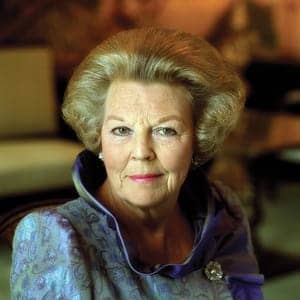by Lisa Vives
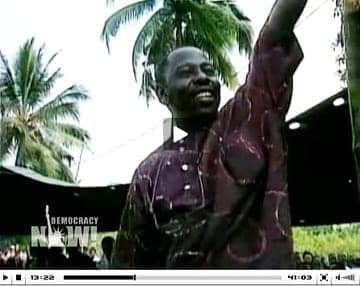
While agreeing to the settlement, Royal Dutch Shell insisted it played no part in the death of charismatic leader Saro-Wiwa, and was providing the money as a “humanitarian gesture.”
A spokesman for the Movement for the Survival of the Ogoni People, founded by Saro-Wiwa, Bariara Kpalap, cautioned that money would not heal the wounds created by years of toxic oil fumes and leaks. “Shell has inflicted much suffering on the Ogoni people through its operations. As farmers and fishermen, we have been deprived of our means of livelihood through the pollution of our lands,” Kpalap said.
“We are still aggrieved with Shell,” said Veronica Kobani, whose husband was killed in the unrest.
Shell’s $5 million trust fund for the Ogoni people was described as grossly inadequate by critics, considering the level of toxic pollution and environmental destruction left by the oil giant.
Lawyers for the plaintiffs expressed satisfaction with the settlement. “It was certainty and an end. It’s been a very long and very difficult path for the plaintiffs themselves,” remarked Judith Brown Chomsky, one of the lead attorneys cooperating with the New York-based Center for Constitutional Rights on the case.
In an interview with Democracy Now’s Amy Goodman, Chomsky said lawyers would now turn their attention to the apartheid cases, cases against companies that supported the apartheid regime in South Africa. “And that will be here in New York. We have individual cases against individual people who were involved in human rights abuses … There’s a lot of work for human rights lawyers, so there’s no shortage of things to do.”
Homeland Security nixes Africa flights
(GIN) – New direct flights from Atlanta, Georgia, to Nairobi, Kenya, have been cancelled by order of the U.S. Dept. of Homeland Security, taking local officials by surprise. Delta Airlines had planned to launch flights from Atlanta to both Nairobi and Monrovia, Liberia, but was forced to postpone the inaugural flights after Homeland Security denied approval, citing security concerns in Kenya and infrastructure problems at Monrovia’s airport.
Kenyan officials reacted angrily to the news posted online even before the government was informed. Foreign minister Moses Wetang’ula at a press conference said: “Things can be done in a much better manner. Great friends like Kenya and America do not have to communicate through website postings.”
Elaborate ceremonies had been planned to celebrate the first direct flight to Kenya from the U.S. Writing in Uganda’s New Vision newspaper, columnist Jerry Okungu said:
“The Delta fiasco is a blow not only to Kenya but the rest of Africa. This flight would have made travel between East Africa and North America a mere 12-hour flight as opposed to the current 20-hour journey with between four and 10-hour layovers in Europe.”
The Transportation Security Administration (TSA) has called the current threat to civil aviation in east Africa too significant to allow the new international service. TSA did however approve an accompanying request to fly into Abuja, Nigeria.
Coverup of President Bongo’s illness ends with his death
(GIN) – Omar Bongo, the world’s longest-serving president and one of the richest, died this week after a month of denials by his government aides that he was ill. He was 73.
Since Bongo’s death at a hospital in Spain, Gabon’s international airport and the nation’s land and sea borders have been closed. It is feared that one of Bongo’s sons will try to seize power, as happened in nearby Togo.
On learning of the leader’s passing, French President Nicolas Sarkozy said in a statement: “It is a great and loyal friend of France who has left us – a grand figure of Africa.”
France has been accused of propping up its old colonial partners in Africa and looking the other way as leaders like Bongo siphoned off their country’s resources, leaving a majority of its people in dire poverty.
The country has more oil pipeline – 886 miles – than paved roads -582 miles. Only 1 percent of its land is cultivated and Gabon produces virtually no food. Libreville, the capital, is said to be the world’s eighth most expensive city.
One of world’s most peaceful countries: Botswana
(GIN) – The newly released 2009 Global Peace Index (GPI) has ranked Botswana as one of the world’s most peaceful countries, as well as the most peaceful country in Africa.
Botswana’s worldwide ranking in the Index was 34 out of the 144 countries measured in the survey, up six places from last year placing it just ahead of the United Kingdom.
Botswana’s high rating was “a result of minimal militarisation, an absence of external or internal conflicts and relatively low scores for most measures of safety and security”, although they further note that the homicide rate remains relatively high.
Botswana’s high and improved position stands in sharp contrast that of neighbouring states, South Africa and Zimbabwe, which were both singled out as numbering among the world’s least peaceful societies.
Botswana’s standing is also consistent with recent Afrobarometer findings, which showed 72 percent of Botswana expressing trust in both the courts and police service and 76 percent agreeing that people were rarely or never treated unequally under the law.
The Global Peace Index is maintained by the Institute for Economics and Peace and developed in consultation with an international panel of experts with data collected and analysed by the Economist Intelligence Unit.
Former U.S. ally dead in Sudan
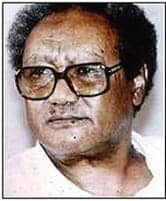
Once a left-wing admirer of Egypt’s late president, Gamal Abdel Nasser, Nimeiri gradually shifted to the right and became a U.S. ally, smashing insurrections by Muslim groups and leftists.
Economic growth ground to a halt during his rule with long lines at the pumps and shortages of basic goods. By early 1985, his problems worsened, with a foreign debt of $9 billion and a devastating drought.
The execution of liberal theologian Mahmoud Mohamed Taha for sedition also whipped up opposition to his rule. During a 1985 state visit to Washington, riots broke out and he was overthrown.
After 14 years in Cairo, Egypt, Nimeiri returned to Sudan in 1999 but played almost no role in national politics.
British hostage refuses offer of freedom
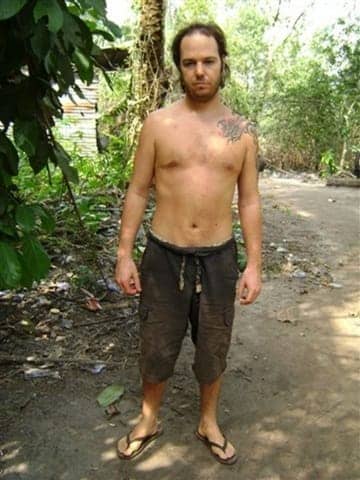
In a statement to the press, the Movement for the Emancipation of the Niger Delta said that Matthew Maguire, a hostage in the southern Nigerian oil swamps for almost nine months, declined their offer to free him on June 1 – his birthday – out of solidarity with the rebels.
In an email statement, the rebels said: “Matthew Maguire has declined the gift of a release from captivity with an argument that he is now an advocate for change in the region.”
There has been fierce fighting in recent weeks between MEND and the army in Delta State over the distribution of the region’s oil wealth. MEND is demanding the release of Henry Okah, a MEND leader currently facing the death penalty at a treason trial being held in secret.
Guinea-Bissau mourning first post-independence leader, Luis Cabral
(GIN) – The government of Guinea-Bissau is calling for three days of national mourning for Luis Cabral, the first post-independence president of the former Portuguese colony also known as Slave Coast. His death occurred in Lisbon, Portugal. He was 78.
Half brother of the noted Pan-African intellectual and liberation movement leader, Amilcar Cabral, Luis Cabral was president from 1974 until his overthrow in 1980 by his prime minister, Joao Bernardo Vieira.
Cabral headed up a program of national reconstruction and development, of socialist inspiration. He had the support of the USSR, China and Nordic countries. But ethnic strife eroded his support as sections of the ruling party claimed that those with Cape Verdean origins were dominating the party. Cabral was sent into exile, first to Cuba, then, in 1984, to Portugal.
Cabral never publicly criticized his former prime minister, who was himself overthrown in 2005 in a deadly coup.
‘Africa will change the world,’ declares the Rev. Tutu
(GIN) – Africa is an emerging continent with hopes that have never been experienced in any other continent, declared former South African Archibishop Desmond Tutu, in a convocation address to the America University of Nigeria, based in Yola.
“Africa is rising gradually but steadily, notwithstanding its many challenges. Africa is a continent that will bring hope to the whole world,” the Nobel laureate said.
Tutu used his speech on Sunday to apologize for last year’s xenophobic outbreak in South Africa, including attacks on Nigerians, calling it “a totally shameless thing to do.” Nigeria, he recalled, had led the struggle against Apartheid as the chair of the Committee on Apartheid of the United Nations. “We showed that we are ungrateful. Forgive us,” he said.
But he cautioned those who criticize Africa to recall the misdeeds of the Western countries. “Have you forgotten the holocaust? Have you forgotten the gulags in Russia? Communism, nazism, fascism did not come from Africa. … A Western country was the first to use weapons of mass destruction in Hiroshima and Nagasaki. Those countries have been able to rise. Africa, there is hope,” he assured.
The 1984 Nobel Peace Prize winner was awarded an honorary doctor of humane letters degree at the ceremony.
A pan-Africanist dies and ‘a giant is lost’

“He insisted it be called Africa Liberation Day, not just Africa Day, because that sounds like celebrating something in the past whereas Africa’s liberation is a struggle still to be achieved,” said Firoze Manji of the online Pambazuka News.
Inspired by the election of Barack Obama, Abdul-Raheem wrote: “Beyond the symbolism and the historical proportions of Obama’s remarkable ascendancy to the presidency, there are many challenges. One’s disappointments are usually directly proportional to one’s expectations. Obama is not a messiah, even though that is what many expect him to be. He cannot solve all the problems of the world. He cannot even solve all the problems of America.
“However, potentially his election gives both Americans and the rest of us a chance to look at things afresh and probably find a solution that we can all live with, even if it may not be perfect,” he wrote, displaying his editorial flair and perspective.
He was also a director of the U.K.-based campaign group Justice Africa and wrote prolifically for newspapers and journals across the continent.
Dr. Tajudeen will be buried in his home state of Katsina. He is survived by his wife Munira, a journalist with the BBC, and two children.
Women’s media group announces its Courage Award
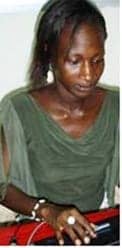
Tailé, who began her journalism career straight out of high school, pursued stories that often put her life in danger. In 2006, weeks after anonymous threats told her to stop reporting, she was abducted by hooded men, beaten severely and left for dead in a ravine.
“She recovered and after that she didn’t shirk. She found another job and continues to report the news. So I think she exemplifies the qualities of the women we honor,” said the foundation’s deputy director, Kathleen Curry.
Cameroon ranks in the bottom third of the index of press freedom. Tailé says progress is slow.
African professionals hit by u.s. recession are going home
(GIN) – A downturn in the U.S. economy is giving African professionals a second thought about life in America, according to a report in the Washington Post. A better life beckons in Africa, the report says.
“The biggest thing for me was quality of life,” remarked James Odhiambo, who said he traded a deluxe apartment in Dallas, a pickup truck, dishwasher and Big Macs for a healthier lifestyle near Kenya’s Lake Victoria.
“I personally know many people who are going back,” said Erastus Mong’are, who works for an insurance company in Delaware and heads an association of Kenyans living there. “The people I know here work two or three jobs just to make ends meet, while in Kenya – despite its problems – people seem more happy. They seem to be getting more time with family. More relaxed. Here, if my neighbor sees I’ve parked in his spot, he becomes so upset.”
“There, if you have a car, you’ll share it with four or five people,” he said. “In the states, if there are five people in the house, they have five cars. There’s a lot of ‘This is mine.'”
With the money he saved in the states, Odhiambo plans to start his own business – a kind of private coast guard for Lake Victoria, modeled on the community fire stations in the U.S.
“Right now, I’m just waiting for my business registration,” Odhiambo told the Post, while savoring a warm sunset breeze. “Here, the pace is a whole lot slower.”
Kennedy Peace Prize goes to Leymah Gbowee of Liberia

“Leymah Gbowee and the women of Liberia assumed personal responsibility for their national destiny, demonstrating the power of citizen activism to change history,” said presenter Caroline Kennedy.
“By bringing together women of all religions, ethnic groups and walks of life to stand up, sit in and speak out against violence and in favor of peace, reconciliation and progress, they played a crucial role in restoring democracy to their war-torn country.”
Gbowee replied: “Sometimes in life, you have a tough decision to make … especially when you’ve been pushed so far back that you have two options: Either you fight back or you allow yourself to be pushed through a wall; and the women of Liberia, including myself, decided that we would fight back.”
The award was presented at the JFK Presidential Library on May 18.
Kenyan prime minister begins U.S. tour

It will be the first time that Odinga is visiting the U.S. since the election of President Obama, whose father was Kenyan. The prime minister was not expected in Washington.
Last week, U.S. Assistant Secretary for African Affairs Johnnie Carson was in Kenya last week and met President Kibaki and Prime Minister Odinga.
Carson, a former U.S. ambassador in Nairobi, said there were “enormous concerns” in Washington that the coalition government was not taking effective action against extrajudicial killings and corruption.
“If there is another crisis here, it would be enormously devastating … and there could be more violence in the next elections,” he said. “To have economic progress, you must have political stability and punish impunity.”
Ghana to play host in July to President Obama
(GIN) – President Obama’s next African tour includes an official visit to Ghana but not Nigeria, where an “all out war” threatens the oil fields of the Niger Delta and charges of fraud cloud a recent regional vote.
The purpose of the July trip is to “strengthen the U.S. relationship with one of our most trusted partners in sub-Saharan Africa” and also to “highlight the critical role that sound governance and civil society play in promoting lasting development,” the White House said.
While Nigeria remains a strategic partner of the U.S. on African issues, Ghana has earned greater merit with the U.S. on its domestic successes, including its successful transfer of power from one party to another, according to a White House source.
Kenyan Independence War vets renew ‘torture’ suit
(GIN) – Lawyers for five veterans of Kenya’s independence war are preparing a claim against the British army for alleged atrocities by U.K. soldiers, including castration, sexual abuse and unlawful detention.
Five elderly Kenyans – three men and two women in their 70s and 80s – detained during the 1950s insurgency are the lead claimants in the reparations case to be lodged at the High Court in London on June 23. The case is being brought by the Mau Mau War Veterans’ Association and the Kenya Human Rights Commission through a London law firm. Earlier suits in 2006 and 2007 were denied.
If the five claimants are successful, thousands of other people imprisoned and abused during the 1950s and early 1960s could be added to a potentially huge class action suit. According to the Kenya Human Rights Commission, an estimated 90,000 Kenyans were executed and 160,000 people detained during the insurgency, including Onyango Obama, grandfather of President Barak Obama.
Gitu Wa Kahengeri, 79, spokesman for the Mau Mau War Veterans Association, who spent seven years in detention camps, said that the advanced age of the veterans meant the claim was extremely urgent. “Britain knows what it did. It would be morally wrong to deny us.”
The U.K. government has said the claim is invalid because of the time lapsed since the alleged abuses. But Kenyan lawyers respond that it has taken long to secure justice because the so-called “Mau Mau” movement had been illegal in Kenya for 51 years. President Kibaki lifted the ban in 2003.
Convicted white killer makes financial offer for freedom
(GIN) – Sentencing of convicted killer Thomas Cholmondeley, great-grandson of Kenya’s most prominent early settler, took a bizarre turn when lawyers for Cholmondeley offered compensation to his victim’s widow in return for his freedom.
The white Kenyan aristocrat had been found guilty by the Nairobi High Court of manslaughter in the death of Robert Njoya, 37, an alleged poacher, on his estate in 2006.
Since the death of Njoya, his 31-year-old widow, Serah, has struggled to raise their four sons on her meager earnings selling vegetables. After the hearing, she said she would be happy with a ruling which guaranteed her financial security and allowed Cholmondeley to walk free after 1,097 days in jail.
Chief prosecutor Keriako Tobiko cautioned the court to remember the seriousness of the offence, the nature of the victim’s injuries and the fact that he had died from a bullet fired by Cholmondeley’s high-velocity rifle. Manslaughter normally carries a maximum sentence of life imprisonment.
One year prior, Cholmondelay admitted shooting another man – Maasai ranger Samson Ole Sisina – but the case was dropped for lack of evidence, provoking outrage and mass protests in the Maasai community.
The end of the three-year trial has provoked fierce debate among ordinary Kenyans and the country’s small community of whites descended from the original British settler families, and the colonial-era High Court has been packed with television crews, Cholmondeley’s family and friends, Njoya’s relatives and dozens of onlookers.
Samuel L. Jackson eyes new role as Kenyan pirate negotiator
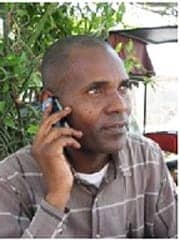
“There are lots of people making money from piracy who would like us out of business,” he says. He survives by working as freelance writer on the side.
Somalia’s 2,000-mile coastline is one of the most dangerous in the world for shipping.
Mwangura, who trained as a marine engineer, runs without the help of a secretary, offices or computers. “We don’t have any of that,” he says. “We send a little text message, and then suddenly it’s big news, with CNN and the BBC calling.”
Asked about the possible biopic starring Jackson, Mwangura said: “I don’t want ‘Pirates of the Caribbean.’ I am a living man, and you can’t say lies about a living man … I am what I am – someone who does things for forgotten people and the community.”
Lisa Vives is executive director of the Global Information Network, Lisa Vives is executive director of Global Information Network, www.globalinfo.org, which distributes news and features on Africa and the developing world about global issues that are overlooked or under-reported by mainstream media. She can be reached at ipsgin@igc.org.





